by Katherine Norris | May 28, 2020 | Academics, COBA Faculty, Research, Uncategorized
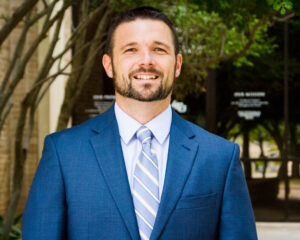 COBA professors have been in a researching groove lately (as Don Pope would say, “They must be butter; they’re on a roll.”). We have seen professors such as Dr. Monty Lynn, Dr. Ryan Jessup, and now Dr. Dennis Marquardt, continue to conduct important research and have their work published in industry journals. Dennis Marquardt recently wrote a paper entitled: “Leader Goal Orientation and Ethical Leadership: A Socio-Cognitive Approach of the Impact of Leader Goal-Oriented Behavior on Employee Unethical Behavior.” The paper was written with co-authors Dr. Wendy Casper at UT-Arlington and Dr. Maribeth Kuenzi at SMU.
COBA professors have been in a researching groove lately (as Don Pope would say, “They must be butter; they’re on a roll.”). We have seen professors such as Dr. Monty Lynn, Dr. Ryan Jessup, and now Dr. Dennis Marquardt, continue to conduct important research and have their work published in industry journals. Dennis Marquardt recently wrote a paper entitled: “Leader Goal Orientation and Ethical Leadership: A Socio-Cognitive Approach of the Impact of Leader Goal-Oriented Behavior on Employee Unethical Behavior.” The paper was written with co-authors Dr. Wendy Casper at UT-Arlington and Dr. Maribeth Kuenzi at SMU.
We asked Dr. Marquardt where his motivation and inspiration to work on this research came from. “For the past decade, I’ve been fascinated by the idea of ‘unintended consequences,’ specifically as this applies to leader/follower dyads. In other words, are there attitudes or behaviors that managers engage in that don’t necessarily seem unethical, but may have the consequence of unknowingly encouraging unethical behavior among employees.”
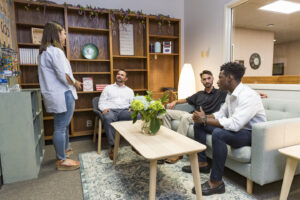
Photo by Jeremy Enlow
Dr. Marquardt summarized the concepts in the research and what type of consequences can come from such situations saying, “In this paper, we propose that leaders with high levels of a performance-avoid goal orientation are perceived to be less ethical and in turn, encourage employees to engage in unethical behaviors. Performance-avoid goal orientation refers to the extent to which a person approaches tasks or goals with a desire to not look incompetent compared to their peers. When a leader has such an orientation they are likely to send cues and signals to employees that making mistakes is to be avoided at all costs, that having the appearance of incompetence is unacceptable, or that making the leader look bad is a cardinal sin.”
He continued, “These cues and signals don’t seem unethical on their own, but imagine what they might do to employees over time. If I’m constantly hearing about avoiding mistakes and failures and trying to not look incompetent, what do I do when I actually do make a mistake? We propose that you might have a higher propensity to consider covering things up, blaming others, or lying about your performance. Our study analyzing several hundred leader/follower dyads found that leaders with high levels of avoid-goal orientation have significantly lower levels of ethical leadership (as perceived by their followers) and have employees who are more likely to engage in unethical behavior. Only when leaders also had a high learning goal orientation did the effects of avoid goal orientation become non-significant.”
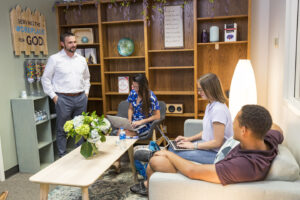
Photo by Jeremy Enlow
Having this paper published is definitely a feeling of joy and accomplishment for Marquardt. “This paper has been in the works since 2014 and out of all my published papers, it’s the one I’m most proud of. God is good! There are many times I was going to give up on it because it took so many hours of work over these past six years. I’m thankful for great co-authors who are people I respect and people who have modeled a learning goal orientation for me.”
Dr. Marquardt’s paper “Leader Goal Orientation and Ethical Leadership: A Socio-Cognitive Approach of the Impact of Leader Goal-Oriented Behavior on Employee Unethical Behavior.” was published in the Journal of Business Ethics this May and is available for reading by clicking here.
by Isabella Maradiaga Molina | May 21, 2020 | Academics, Alumni Spotlight, COBA Faculty, Marketing, Research, School of Information Technology and Computing, Uncategorized
Have you ever struggled to make a decision when given too many options? Choice overload, or overchoice, is a cognitive process where people have difficulty making a decision due to a variety of options. Why does this happen?
As part of the lifelong relationship vision of the College of Business Administration, Associate Professor of Marketing, Dr. Ryan Jessup, and SITC Director and Professor of Computer Science, Dr. John Homer, partnered with ACU alum, Levi Ritchie (’15), to research the choice overload effect. Their paper, “Hurry up and decide: Empirical tests of the choice overload effect using cognitive process models”, was featured in the American Psychology Association’s April issue on decision. According to Scimago Journal & Country Rank, this journal is in the top 10% in psychology, neuropsychology and physical psychology subfield.
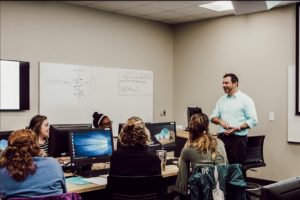
Dr. Ryan Jessup
While in graduate school at Indiana University, Dr. Ryan Jessup collected data to study a theory of decision making that prompted him to conduct this research as a follow-up from that work. As the lead author, Dr. Jessup generated the research idea and designed the experiment which was programmed by Dr. Homer. Levi Ritchie helped program part of the experiment in Python, recruited participants, and collected data before analyzing the data along with Dr. Jessup. The team combined their expertise in their respective fields to compile and edit the paper that was then published in the APA Journal. Dr. Jessup described the goal of their research as, “We wanted to test between multiple competing hypotheses that I had proposed in an earlier paper for the choice overload aka too much choice effect. The effect is that people purchase more when they have fewer options to choose from, violating basic economic principles.”

Levi Ritchie (’15)
The science of cognitive psychology is broad and contains a variety of potential research studies; however, Levi Ritchie described the importance of studying the choice overload effect as essential to the business field, “From a business perspective, understanding the elements that moderate the effect is crucial to marketing. Even when your selection of alternatives is plentiful, it may be beneficial to only present the strongest subset.” Similarly, Dr. Jessup commented on how important the understanding of this effect is when selling or promoting a product, as well as for personal decision making.
“An interesting thing about conducting quality research is that it makes us better at teaching. In my case, it is particularly true because I tend to teach courses on how to conduct or analyze research. But, even if I were teaching a different type of course it would still improve my teaching for several reasons. First, when teaching on a relevant topic, I would be far more aware of the pioneering research – in some cases because I would have been the one to do it; in other cases, it would be because I had to examine all possible theories and explanations when conducting my research, simultaneously giving far more breadth and depth than I would have gotten had I just read about it in the textbook or merely just read a few things about it. In essence, researchers know more about these findings because they are the ones making them – we are not merely reading about them. It is the ultimate in experiential learning”, Jessup said.
The conclusion of this research was explained in-depth in their publication, but Jessup summarized by saying, “We found that one of our proposed explanations well predicted the data whereas another one – the one that is commonly espoused as causing the effect – did not appear to play a role. A specific conclusion was time pressure appears to really drive the effect; so, if you are trying to sell things to people who are often hurried – think drive-thru’s or situations where people often have little children with them – you are better off giving them a very small set of options.”
Levi Ritchie is currently pursuing a career in Data Science, while Dr. Jessup continues to work on research on an improved theory of decision making that combines choice with learning. He is currently working on another project that involves the choices of married individuals and economic games with professors Katie Wick, John Homer and, recently graduated marketing major, Luke Stevens (’20).
by Katherine Norris | May 14, 2020 | Academics, COBA Faculty, Faith Infusion, Outcomes, Poverty and Development, Research, Uncategorized
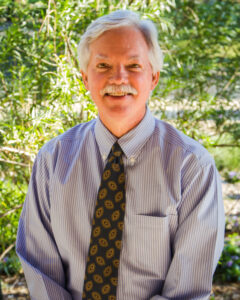 Do you ever wonder what COBA professors do when they aren’t teaching class? You may not know it, but many of our professors commit their time to conducting research of all different types. Dr. Monty Lynn recently co-authored a research article titled, “Better Together: Improving Food Security and Nutrition by Linking Market and Food Systems”. The article is a literature review of market and food systems informing on the latest impacts of COVID-19 towards global food security.
Do you ever wonder what COBA professors do when they aren’t teaching class? You may not know it, but many of our professors commit their time to conducting research of all different types. Dr. Monty Lynn recently co-authored a research article titled, “Better Together: Improving Food Security and Nutrition by Linking Market and Food Systems”. The article is a literature review of market and food systems informing on the latest impacts of COVID-19 towards global food security.
Dr. Lynn says, “The article is the fruit of a collaborative effort with technical advisors at World Vision and CARE, supplemented by faculty members at ACU and the Catholic University of America. To share the findings, the article authors will host a webinar in June to describe our work, mostly with a global CARE and World Vision audience. In the article, we combine two popular approaches in global food security which attempt to strengthen markets and nutrition, and we describe CARE and World Vision food security programming that illustrates the model. In the webinar, we will describe the latest information from CARE and World Vision on how the coronavirus pandemic and COVID-19 are impacting global food security.” Dr. Lynn notes that “It is a welcome and special opportunity to join a research team with two of the largest development organizations in the United States and to collaborate with my colleague, Dan Norell, a Senior Technical Advisor in Economic Development at World Vision in Washington, D.C.”
The article and webinar will explore the following:
- The Inclusive Market and Food Systems Model
- The importance of bringing the market to vulnerable households
- How empowering women multiplies nutritional outcomes
- How access does not necessarily equal consumption
- The impact of COVID-19 on programming and adaptive management for livelihood programs
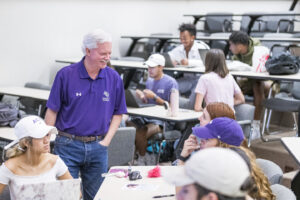
Photo by Jeremy Enlow
International development is a topic that Dr. Lynn stays current with for his research and an International Development class that he occasionally teaches at ACU. His recent research shows that “Major gains have been made in global food security, reducing global hunger. Gains began eroding in 2015, however, and global food insecurity began rising again. Nearly one billion people are food insecure today and 140 million of those became food insecure because of the impact of the coronavirus pandemic and mitigation efforts that have disrupted food production and supply chains.”
This blog post is just a glimpse of the information that is covered in the research article. We encourage you to read the full article HERE and join the webinar on May 19th at 12:30 pm EST, Washington, D.C. time zone HERE.
by M. C. Jennings | May 7, 2020 | Academics, COBA Faculty, Current Students, Financial Management, Student Trading and Research (STAR), Uncategorized
Since its inception in 1999 with an initial amount of approximately $100,000, STAR has had several goals in mind. One of those goals was reached when the group hit a huge milestone with $1.5 million in their portfolio this past spring although the portfolio has dipped slightly with the recent economic crisis due to the COVID-19 pandemic. Another one of those goals was reached today when the group was able to make their first distribution from earnings.
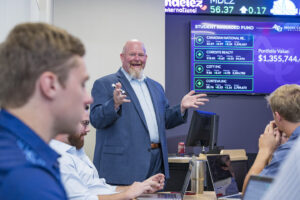
Photo by Jeremy Enlow
Assistant Professor of Finance Dr. Jody Jones, said that the distribution will be “$63,000, roughly 4.5% of the December 31, 2019 balance. Students ‘final’ this Thursday is to make sure they have the cash to distribute back to the endowment. The cash for this disbursement came primarily from gains made this semester on Ford (F), Gold (GLD), and decreasing the holdings in Healthcare Inc (HCA). As of this writing, the fund is $1.3 million (almost to the penny) and STAR is beating the S&P 500 by almost 5% YTD.”
STAR is a student-managed equity fund that is part of the university’s endowment. This semester the students must have $63,000 (4.5% of the 12/31 value) in cash. That money will be used to support the operation of the university as a whole. Jones says that students gain experience that will career over into their professional careers in the future. “Managing over $1 million dollars is something they can put on their resume and shows they have experience – especially this semester when many students lost jobs and internship opportunities.”
Senior Finance major Hunter Jennings said that he learned many things from his time in STAR. “I learned that in order to learn and be successful, you have to be willing to take risks. This experience will translate into my professional career because it pushed me to make decisions and effectively communicate my thoughts and ideas with my peers.”
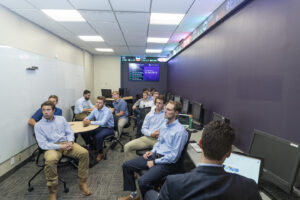
Photo by Jeremy Enlow
As for learning during a time when the stock market was particularly volatile, Jennings said, “The stock market can be rewarding and it can hurt you. It is all about how you react to those changes. There was a point where we had the fund to its highest value, just to have the market crash and the value go back to where we started.”
Hunter encourages students to consider being a part of the group. “I think that if anyone is interested in getting to work with a team and see real-world results, then they should join STAR. You don’t have to have any experience trading stocks or even be a finance major. Overall, it was one of my favorite classes to take at ACU.”
by Maddy Crockett | Apr 23, 2020 | Academics, Accounting, Current Students
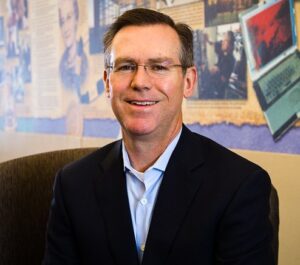 Cliff Crockett (’89), Partner at the accounting firm KPMG in Dallas, Texas, has been conducting interviews for accounting internships at ACU for the past twenty years. This year’s global pandemic proved to be a bit of a challenge. Yet, the social distancing guidelines moved them in the direction that many companies across the country are taking: adapting to virtual interviews.
Cliff Crockett (’89), Partner at the accounting firm KPMG in Dallas, Texas, has been conducting interviews for accounting internships at ACU for the past twenty years. This year’s global pandemic proved to be a bit of a challenge. Yet, the social distancing guidelines moved them in the direction that many companies across the country are taking: adapting to virtual interviews.
“We have always done face to face interviews and much prefer them. So this was the first time to do Skype interviews on a broad basis,” Cliff explained. While exceptions have been made before to accommodate students out of the country on study abroad, in-person interviews are the ideal platform to allow interaction with the students.
“We typically have a pre-interview dinner the evening before the interview so that we can get to know them better. This also allows the students to ask a lot of questions to multiple KPMG employees to help them feel more comfortable and get to know KPMG better. The students also get to interact with our greeters right before the in-person interview, so they miss out on this as well.”
Students initially had their interviews scheduled for March 26th, but when the campus closed, they instead began to prepare for virtual ones. When asked if this changed their approach in preparing, sophomore Lacy Mayes explained, “I had to practice looking at the camera instead of the screen. It’s definitely a different approach when you can’t shake hands or look at them directly in the eyes.”
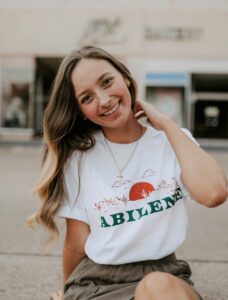
Mikel-Ann Terry
One of the main concerns for virtual interviewing is technology issues, from poor connections to glitches. “I think it is harder for students doing it this way than for the interviewer actually,” Mr. Crockett explained, as KPMG is accustomed to meeting virtually with clients and employees. He advised students to double-check that their technical setup was working well before their interview. However, even when issues arose, junior Mikel-Ann Terry said that the interviewers were very understanding of any issues encountered, saying, “I would encourage anyone thinking about an internship to interview with them, even if it is just for the experience!”
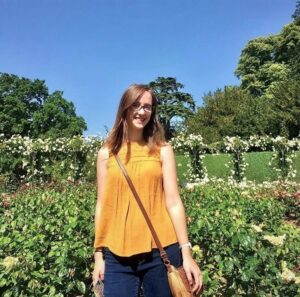
Hannah Pinson
Even though face to face is the ideal platform for interviewing, going virtual is providing students with valuable experience – regardless of location. Senior Rachel Rankey shared, “I learned to speak with confidence so they know what you’re saying and why you were right for that position. I also learned that oftentimes, they just want to get a sense of who you are rather than grilling you with a lot of questions that might be hard to answer”. Junior Hannah Pinson said that she enjoyed the virtual aspect, once she grew accustomed to it.
Crockett concluded by sharing how much he loves being on campus and interviewing ACU students. He and his team look forward to being on campus as soon as they can. “ACU does a great job preparing their business and accounting students for the real world, so take full advantage of your education!”
by Maddy Crockett | Apr 14, 2020 | Academics, Current Students, Student Spotlights
In the College of Business Administration, students across the board have experienced the challenge of creating and selling a product to their peers however students this semester are facing an additional challenge: creating and selling their product — from home. All business students are required to take the class Intro to Business. This class gives students an idea of what different fields of business are all about. One of the main projects in the course is an entrepreneur-type activity called ‘Venture Out’. Teams are built to create, market, and sell a product to the ACU community; incentives include grades throughout the course, entrepreneur experience, and the opportunity to donate additional profits to the beneficiary of the team’s choice. Products in the past have ranged from t-shirts, stickers, sweatshirts, or anything that can be dreamed up. The teams must keep track of expenses, create a business plan, and pitch their product to a board of professionals for approval.
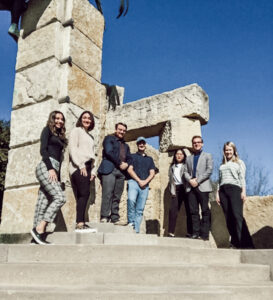 While this project provides students with valuable experience, current Intro to Business students impacted by the campus closure are having to promote and sell their products remotely. Intro to Business professor Dr. Monty Lynn explained that due to this issue, not all of the teams were able to proceed with the project due to funding and selling issues. Venture Out teams who were already underway in their project chose to continue and are now facing the challenge of selling that product away from the ACU campus. Dr. Lynn commented that despite this extra obstacle, “They are doing a tremendous job”.
While this project provides students with valuable experience, current Intro to Business students impacted by the campus closure are having to promote and sell their products remotely. Intro to Business professor Dr. Monty Lynn explained that due to this issue, not all of the teams were able to proceed with the project due to funding and selling issues. Venture Out teams who were already underway in their project chose to continue and are now facing the challenge of selling that product away from the ACU campus. Dr. Lynn commented that despite this extra obstacle, “They are doing a tremendous job”.
Two of these current participating teams shared their experience so far. 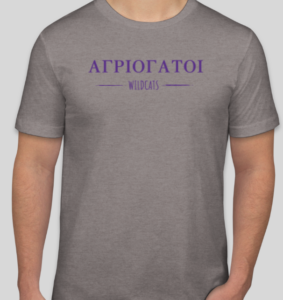 “It was more difficult to connect with our customers and explain why we were selling this product,” explained Berkley Bruckner, member of Team Foundation T’s. They chose to sell t-shirts, and created the design in hopes of boosting school spirit and promoting awareness for Big Brothers Big Sisters, their chosen beneficiary. “Since most of our group members are freshmen, we wanted to incorporate a class we all have to take this year. We chose our Bible class and wrote ‘Wildcats’ in Greek”.
“It was more difficult to connect with our customers and explain why we were selling this product,” explained Berkley Bruckner, member of Team Foundation T’s. They chose to sell t-shirts, and created the design in hopes of boosting school spirit and promoting awareness for Big Brothers Big Sisters, their chosen beneficiary. “Since most of our group members are freshmen, we wanted to incorporate a class we all have to take this year. We chose our Bible class and wrote ‘Wildcats’ in Greek”.
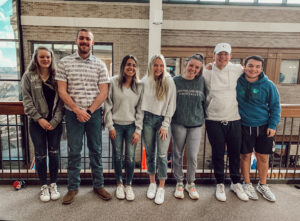 Another team experienced similar issues. When asked what has been a challenge for them, member Estefany Hernandez stated that “We couldn’t express our feelings about where the money will be donated or to express our love for children and giving back”. They chose the Hendrick Home for Children as their beneficiary and decided on t-shirts as well for their product.
Another team experienced similar issues. When asked what has been a challenge for them, member Estefany Hernandez stated that “We couldn’t express our feelings about where the money will be donated or to express our love for children and giving back”. They chose the Hendrick Home for Children as their beneficiary and decided on t-shirts as well for their product.
Despite the challenges posed for this unprecedented sales environment that COVID-19 has brought on, these student teams are persevering and are learning valuable skills. Dr. Monty Lynn shared a customer’s experience with one of these continuing Venture Out teams: “An ACU graduate student recently contacted me to say she purchased some stickers from a team and was so impressed with the transaction. She received the ordered stickers in the mail shortly after purchasing it online. The product even arrived with customer service touches and an e-invoice! So just a shout-out to our freshmen business teams who have pivoted quickly and are serving well!” COBA is proud of these teams for their success and perseverance during this time and believes that unique business lessons are being learned about the need for flexibility and agility in small businesses that will stay with these students for a lifetime.
 COBA professors have been in a researching groove lately (as Don Pope would say, “They must be butter; they’re on a roll.”). We have seen professors such as Dr. Monty Lynn, Dr. Ryan Jessup, and now Dr. Dennis Marquardt, continue to conduct important research and have their work published in industry journals. Dennis Marquardt recently wrote a paper entitled: “Leader Goal Orientation and Ethical Leadership: A Socio-Cognitive Approach of the Impact of Leader Goal-Oriented Behavior on Employee Unethical Behavior.” The paper was written with co-authors Dr. Wendy Casper at UT-Arlington and Dr. Maribeth Kuenzi at SMU.
COBA professors have been in a researching groove lately (as Don Pope would say, “They must be butter; they’re on a roll.”). We have seen professors such as Dr. Monty Lynn, Dr. Ryan Jessup, and now Dr. Dennis Marquardt, continue to conduct important research and have their work published in industry journals. Dennis Marquardt recently wrote a paper entitled: “Leader Goal Orientation and Ethical Leadership: A Socio-Cognitive Approach of the Impact of Leader Goal-Oriented Behavior on Employee Unethical Behavior.” The paper was written with co-authors Dr. Wendy Casper at UT-Arlington and Dr. Maribeth Kuenzi at SMU. 



 Do you ever wonder what COBA professors do when they aren’t teaching class? You may not know it, but many of our professors commit their time to conducting research of all different types. Dr. Monty Lynn recently co-authored a research article titled, “Better Together: Improving Food Security and Nutrition by Linking Market and Food Systems”. The article is a literature review of market and food systems informing on the latest impacts of COVID-19 towards global food security.
Do you ever wonder what COBA professors do when they aren’t teaching class? You may not know it, but many of our professors commit their time to conducting research of all different types. Dr. Monty Lynn recently co-authored a research article titled, “Better Together: Improving Food Security and Nutrition by Linking Market and Food Systems”. The article is a literature review of market and food systems informing on the latest impacts of COVID-19 towards global food security.


 Cliff Crockett (’89), Partner at the accounting firm KPMG in Dallas, Texas, has been conducting interviews for accounting internships at ACU for the past twenty years. This year’s global pandemic proved to be a bit of a challenge. Yet, the social distancing guidelines moved them in the direction that many companies across the country are taking: adapting to virtual interviews.
Cliff Crockett (’89), Partner at the accounting firm KPMG in Dallas, Texas, has been conducting interviews for accounting internships at ACU for the past twenty years. This year’s global pandemic proved to be a bit of a challenge. Yet, the social distancing guidelines moved them in the direction that many companies across the country are taking: adapting to virtual interviews.

 While this project provides students with valuable experience, current Intro to Business students impacted by the campus closure are having to promote and sell their products remotely. Intro to Business professor Dr. Monty Lynn explained that due to this issue, not all of the teams were able to proceed with the project due to funding and selling issues. Venture Out teams who were already underway in their project chose to continue and are now facing the challenge of selling that product away from the ACU campus. Dr. Lynn commented that despite this extra obstacle, “They are doing a tremendous job”.
While this project provides students with valuable experience, current Intro to Business students impacted by the campus closure are having to promote and sell their products remotely. Intro to Business professor Dr. Monty Lynn explained that due to this issue, not all of the teams were able to proceed with the project due to funding and selling issues. Venture Out teams who were already underway in their project chose to continue and are now facing the challenge of selling that product away from the ACU campus. Dr. Lynn commented that despite this extra obstacle, “They are doing a tremendous job”.  “It was more difficult to connect with our customers and explain why we were selling this product,” explained Berkley Bruckner, member of Team Foundation T’s. They chose to sell t-shirts, and created the design in hopes of boosting school spirit and promoting awareness for Big Brothers Big Sisters, their chosen beneficiary. “Since most of our group members are freshmen, we wanted to incorporate a class we all have to take this year. We chose our Bible class and wrote ‘Wildcats’ in Greek”.
“It was more difficult to connect with our customers and explain why we were selling this product,” explained Berkley Bruckner, member of Team Foundation T’s. They chose to sell t-shirts, and created the design in hopes of boosting school spirit and promoting awareness for Big Brothers Big Sisters, their chosen beneficiary. “Since most of our group members are freshmen, we wanted to incorporate a class we all have to take this year. We chose our Bible class and wrote ‘Wildcats’ in Greek”. Another team experienced similar issues. When asked what has been a challenge for them, member Estefany Hernandez stated that “We couldn’t express our feelings about where the money will be donated or to express our love for children and giving back”. They chose the Hendrick Home for Children as their beneficiary and decided on t-shirts as well for their product.
Another team experienced similar issues. When asked what has been a challenge for them, member Estefany Hernandez stated that “We couldn’t express our feelings about where the money will be donated or to express our love for children and giving back”. They chose the Hendrick Home for Children as their beneficiary and decided on t-shirts as well for their product.